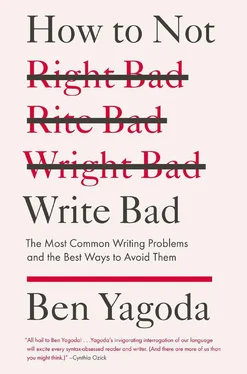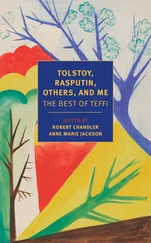d. Skunked Words
I’m taking a wild guess that when some readers came to the second-to-last paragraph (the one that starts “Some eggcorns…”), their reaction to at least one or two of the examples was “But, that’s right!”
To understand why they’re not, it’s helpful to think about “skunked terms,” a phrase coined by Bryan Garner, in his excellent book Garner’s Modern American Usage. (No comma after book because Garner is the author of several outstanding tomes.) Garner explained: “When a word undergoes a marked change from one use to another — a phase that might take ten years or a hundred — it’s likely to be the subject of dispute.” Even as the new meaning gains popularity, traditionalists — or, as they’re sometimes called, “prescriptivists”—dig in their heels and roundly condemn it as ignorant, illiterate, unacceptable, etc.
Garner observes — and I agree—“To the writer or speaker to whom credibility is important, it’s a good idea to avoid distracting any readers,” and thus he counsels avoiding these words and phrases. I agree with that, too.
The trouble is, like the language itself, the corpus of skunked words is always changing. To take just a few examples, I can remember when prescriptivists and sticklers used to grumble about the use of contact as a verb, as in When are you going to contact the senator? Hard to believe, but it’s true. Obviously, they lost that battle a long time ago. Even longer ago, the expressions champing at the bit, stamping grounds, tit-bit, and pom-pon roamed the earth. Eventually (more specifically, by the end of the nineteenth century), they turned into chomping, stomping, tidbit, and pom-pom. If you used the older forms today, you would get some seriously strange looks.
Again, I’ll note that writing and speaking have different standards. In conversation, getting your meaning across is really the important thing, while writing for publication or in a business, journalistic, or academic setting demands a higher standard of rules and propriety. Thus new words and new meanings gain acceptance in conversation years or even decades before they do in writing.
Going back to the list of common eggcorns, let’s take a look at duct tape, a roll or two of which you can probably find less than fifty feet from where you’re sitting. It’s called duct tape because its original use was to tape up ducts, but duct is hard to say, so people started calling it “duck tape,” and then people started writing “ duck tape.” You can even buy a brand of duct tape called Duck Tape. There’s a fun Web site called Google Fight (http://googlefight.com) that allows you to type in a pair of words or phrases and see how many times each of them has been used on the Internet. I just staged a fight between duck tape and duct tape. Duct tape won, but by a relatively slim margin of 1.83 million to 1.07 million. Before too long, duck tape will prevail, and duct tape will seem as antique and dusty as an e-mail message. But that day is not here yet, and using duck tape will still make you seem a bad writer, to at least some of your readers.
A list of current skunkers is below. Once again, some may seem perfectly fine, but all have traditional meanings different and in some cases opposite from the ones in popular use. (If you don’t believe me, look them up.) Going beyond the list, the best general way to avoid these guys is to read good writers in books and respectable publications, and follow their lead. As for an individual word, if you have any doubt as to its meaning, look it up in the dictionary. Either the skunked meaning won’t be there, or it will be the fourth or fifth definition, followed by a note that says something like nonstandard or objected to by some. And Google Fight is useful as well. If a onetime skunked term wins by a standard of at least two-thirds, I hereby declare it sanitized and ready to use.
The word in the left-hand column is the current skunked term; acceptable alternative(s) follow. When the skunked term has a different meaning, it’s given in parentheses.
alumni alumni is correct for plural, but for singular use alumna (female) or alumnus (male). alot a lot alright all right (However, similar words such as already and awhile can can be okay if used carefully.) bemused amused ( Bemused = distracted or bothered.) cliché ( as adjective, as in That’s so cliché ); clichéd. comprised of composed of; made up of couple (as in couple things ) couple of disinterested uninterested ( Disinterested = impartial.) fortuitous lucky coincidence; felicitous ( Fortuitous = accidental; unplanned.) fun (as adjective, as in the funnest vacation ever ) most enjoyable, or rewrite sentence. genius (as adjective, as in a genius idea ) inspired; brilliant; ingenious grow (transitive verb, as in grow the business ) develop; build up less; fewer Less is used with a general, uncountable entity, as in less water or less energy, or as a general proposition: He wanted more, but I wanted less. Fewer is used with what can be counted: fewer cars. Less money means fewer dollars. * hopefully I hope that impact (as verb) affect; have an impact on myself (as subject, as in Jesse and myself spent the whole day in the library ) I nonplussed unfazed; nonchalant ( Nonplussed = taken aback.) novel book ( Novel = book-length work of fiction, as opposed to drama, poetry, or nonfiction.) notorious, infamous famous ( Notorious, infamous = famous for something bad.) penultimate ultimate ( Penultimate = second to last.) phenomena (as singular) phenomenon presently currently; now ( Presently = shortly; soon.) verbal oral; spoken ( Verbal = in or having to do with words.)
One short skunked word and its relatives demand a fuller explanation. The word is they when used as an “epicene pronoun” (EP), that is, in place of a singular antecedent. For example:
1. [ Any student who wants to attend the game should bring their ID card to the ticket window. ]
2. [ Arcade Fire and about 20,000 of their fans turned the PNC Center into a raucous party Thursday night. ]
3. [ The Court Street Pub is changing to their summer menu this week. ]
The EP has a lot of arguments in its favor. In example 1, replacing their with his would sound sexist; her sounds like you’re trying too hard not to be sexist; and his or her could come off as stilted. Meanwhile, using it for a rock band just sounds weird. Consequently, the EP — and all three of the above examples — are perfectly fine in conversation. I predict that they’ll be acceptable in formal writing in ten years, fifteen at the maximum. However, they’re not acceptable now, so you have to make adjustments.
1. Any student who wants to attend the game should bring his or her ID card to the ticket window.
A write-around is even better:
If you want to attend the game, you have to bring your ID card to the ticket window.
2. Arcade Fire and about 20,000 fans turned the PNC Center into a raucous party Thursday night.
3. The Court Street Pub is changing to its summer menu this week.
(For Skunked Grammar, see II.C.2.d.)
Читать дальше












